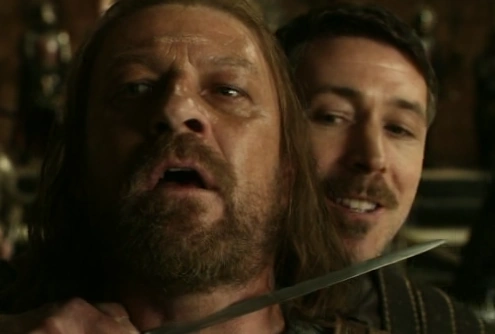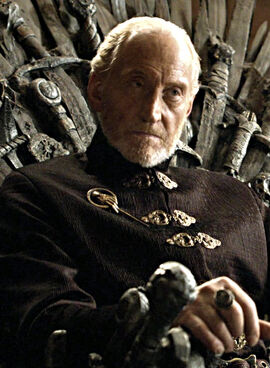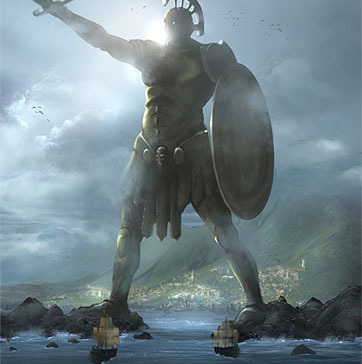The Iron Throne Handbook: What political science can tell us about the game of thrones
In the game of thrones, you live or you die — often no less on Earth than in Westeros, where Cersei Lannister warned Ned Stark about the high stakes he was playing with.
.jpg) Though there are fewer thrones around the real world these days, the principles of seizing and holding power aren’t much different whether you’re trying to become the king, the president, or the president-for-life.
Though there are fewer thrones around the real world these days, the principles of seizing and holding power aren’t much different whether you’re trying to become the king, the president, or the president-for-life.
That’s according to Bruce Bueno de Mesquita and Alastair Smith, anyway: two political scientists who’ve studied the “logic of political survival” and written it down in a mass-market work called The Dictator’s Handbook: Why Bad Behavior Is Almost Always Good Politics.
Their thesis: holding power poses basically the same challenges whether you’re a democratically elected prime minister or a totalitarian dictator. “No one rules alone; no one has absolute authority,” they write. “All that varies is how many backs have to be scratched and how big the supply of backs available for scratching.”
It’s an over-simplified model, to be sure, but a useful one. By eliminating differences of kind between types of governance in favor differences of degree, de Mesquita and Smith create a system that can compare presidents and juntas — or mayors and CEOs.
At their core, they argue that the logic of holding power is the same whatever the system: win over the people whose support is essential to remain in power.
Specifically, they argue there are three fundamental groups in any political society:
-
The interchangeables are the people who have “at least some legal say in choosing their leader.” That includes everyone eligible to vote in democracies like the US — as well as in dictatorships like the Soviet Union, which also had formal universal suffrage. Even in a democracy, any given “interchangeable” doesn’t have very much power. The real difference between government types comes in at the other two levels.
-
The influentials are the “real selectorate” — the people who actually choose the leader. Though every Soviet citizen could vote, the actual decisions were made by the members of the Communist Party. In Saudi Arabia, it’s the senior members of the royal family. In the U.S. — the vestigal electoral college aside — it’s the millions of voters who back the winning candidate.
-
The essentials are “the people whose support is essential if the leader is to survive in office.” For a military dictator, that could be the handful of colonels capable of marshaling enough military force to overthrow the leader. In many democracies, at a minimum, it’s 50.1 percent of the voters in 50.1 percent of the districts — theoretically as small as 25 percent of the electorate, though often much larger.
 The difference between a dictator and democrat, then, is primarily in the size of the essentials. A democrat might need to keep millions of people happy with her, a dictator could rely on as few as a dozen.
The difference between a dictator and democrat, then, is primarily in the size of the essentials. A democrat might need to keep millions of people happy with her, a dictator could rely on as few as a dozen.
This matters because if you just need to keep a dozen people happy, you can just bribe them. Each colonel or prince gets mansions, cars and Swiss bank accounts. But you can’t effectively bribe millions of people, so the only way to win their votes is with “public goods”: a strong economy, good education and health care, a system of political rights, national pride, etc.
The bigger the population of essentials, in other words, the more leaders have a personal incentive to better the whole country instead of looting the country to pay off a handful of top lieutenants.
But this is already starting to get a bit dry. So let’s take it all back to Cersei and Ned, and see how the rules of the Dictator’s Handbook apply to the would-be leaders in Westeros and Essos.
(Spoilers ahead for the five published novels in A Song of Ice and Fire and the first five or so seasons of Game of Thrones.)
Ned Stark
Rule: Identify your essential supporters and pay them whatever it takes to get them on your side.
Poor Lord Stark (in what will prove to be a repetitive chorus for his family) instinctively knew many of the rules of holding power but implemented them less successfully than his rivals. As Hand of the King and a powerful lord in his own right, Ned Stark was in a prime position when King Robert Baratheon died. What he needed to do was identify a coalition that could exercise a preponderance of power in King’s Landing, secure this coalition’s loyalty, and then use it to eliminate his enemies. And he came so close! After some dithering, he asks the Master of Coin, Petyr Baelish, to bribe the City Watch to supplement his own household guard, giving him the force he needed to overcome the Queen Regent, Cersei Lannister.
But Ned waited too long and didn’t promise enough. The king’s brother, Renly Baratheon, proposed what de Mesquita and Smith would identify as a more effective approach: a preemptive strike to seize control of the underage king Joffrey. Ned rejected this approach as dishonorable, and so Renly fled the capital with the 100 soldiers he had offered to aid Ned’s coup. “It is absolutely essential to seize the reins of power quickly enough to make sure that your group gets to control the instruments of the state, and not someone else’s,” the Dictator’s Handbook advises.
 The slower-moving strike Ned ended up with could have succeeded — except he was outbid. He didn’t offer Baelish any particular personal payoff. But Cersei did. And so when Ned marched into the throne room with a force of Littlefinger’s Goldcloaks, he — but surely not de Mesquita and Smith — were shocked when the watch turned on Stark and cemented Cersei’s power. “Paying supporters… is the essence of ruling,” they write. “Buying loyalty is particularly difficult when a leader first comes to power. When deciding whether to support a new leader, prudent backers must not only think about how much their leader gives them today. They must also ponder what they can expect to receive in the future.” Petyr Baelish, by grace of Cersei the future Lord of Harrenhal and Lord Protector of the Vale, is nothing if not prudent.
The slower-moving strike Ned ended up with could have succeeded — except he was outbid. He didn’t offer Baelish any particular personal payoff. But Cersei did. And so when Ned marched into the throne room with a force of Littlefinger’s Goldcloaks, he — but surely not de Mesquita and Smith — were shocked when the watch turned on Stark and cemented Cersei’s power. “Paying supporters… is the essence of ruling,” they write. “Buying loyalty is particularly difficult when a leader first comes to power. When deciding whether to support a new leader, prudent backers must not only think about how much their leader gives them today. They must also ponder what they can expect to receive in the future.” Petyr Baelish, by grace of Cersei the future Lord of Harrenhal and Lord Protector of the Vale, is nothing if not prudent.
Another rule Ned Stark broke: silence is golden. The Dictator’s Handbook cites the example of President Ahmed Ben Bella of Algeria, who in 1965 plotted to purge his rivals in the Algerian government. But Ben Bella made the mistake of announcing a politburo meeting to change up the cabinet and army command one week before that meeting was to take place. Given a week to organize, Ben Bella’s underlings overthrew him and seized power for themselves. Similarly, Stark foolishly warned Cersei that he knew Joffrey was not the rightful king — a sentimental gesture that gave her time to organize a forceful claim on power.
Cersei Lannister
Rule: Depend on as few people as possible for power, and especially not on those people who helped you seize power in the first place.
 Though Cersei won control for her house by outplaying Ned Stark, she wouldn’t become the paramount ruler of the Seven Kingdoms until several years later, after the deaths of both her imposing father Tywin and her teenaged son Joffrey. With the impressionable child king Tommen on the throne, Cersei as regent at last had the power she believed was rightfully hers. And though in the long run she would botch the job — you don’t need to be a political scientist to see how creating a religious military force outside her direct control was a mistake — she seemed to grasp some of the more basic dictator’s rules.
Though Cersei won control for her house by outplaying Ned Stark, she wouldn’t become the paramount ruler of the Seven Kingdoms until several years later, after the deaths of both her imposing father Tywin and her teenaged son Joffrey. With the impressionable child king Tommen on the throne, Cersei as regent at last had the power she believed was rightfully hers. And though in the long run she would botch the job — you don’t need to be a political scientist to see how creating a religious military force outside her direct control was a mistake — she seemed to grasp some of the more basic dictator’s rules.
“A wise leader does not count too much on those who helped her gain power,” de Mesquita and Smith write. “A prudent new incumbent will act swiftly to get some of them out of the way and bring in others whose interests more strongly assure their future loyalty. Only after sacking, shuffling and shrinking their particular set of essentials can a leader’s future tenure be assured.” In George R.R. Martin’s fourth novel, A Feast For Crows (though not in the television adaptation), Cersei pushes potential rivals (especially loyalists of the rival Tyrell family) out of the Small Council that runs the Seven Kingdoms’ government, and instead appoints a collection of nobodies: “the biddable Harys Swyft” as Hand, sickly courtier Gyles Rosby as Master of Coin, mercenary bastard Aurane Waters as Master of Ships, and the disgraced ex-maester Qyburn as Master of Whisperers. None of these men had significant forces of their own, making them more dependent on Cersei for their wealth and power.
This achieved Cersei’s immediate goal of securing her reign against enemies at court. But what Cersei overlooked is the long-term picture: in a feudal society such as Westeros, military power does not rest primarily in the hands of the central government, but rather in the array of lords scattered across the land. So excluding the Tyrells and the rump Lannister forces under her uncle Kevan may have given Cersei a freer hand in the capital and given her more time to plot without being overthrown in a palace coup — but in the long run her smaller coalition doesn’t appear to possess the money or power to hold on for long, even with her temporary control of the mechanisms of the state.
(This section has been updated and expanded.)
Robb Stark

Rule: Autocrats should keep wars brief so they don’t waste resources better used keeping themselves in power.
Holding power doesn’t just depend on wielding force in throne rooms. It also involves wielding force on the field of battle. And while the Young Wolf was second to none at winning battles, he lived up to his family’s unfortunate legacy by being a second-rate student of the laws of power.
For an autocrat, it is “better to preserve resources to pay supporters than it (is) to carry on fighting,” the Handbook advises. Democracies will often fight to the bitter end, because it’s not merely the regime’s survival at stake. Autocrats are “likely to grab what they can and return home.” For all his tactical brilliance, that’s not what Robb Stark did in the War of the Five Kings.
After raising his banner in rebellion and being proclaimed the King in the North, Robb Stark won a series of lightning victories over Lannister forces that gave him military dominance over the heartland of the Seven Kingdoms. But rather than using his superior position to bargain for a favorable peace, Robb fought to the bitter end. A fine position for a modern, democratic nation-state. But continuing the war meant Robb was forced to expend resources he could have used to pay off his supporters — not only in private goods for his nobles, but also the public good of security for his northern homeland. Continuing his foreign war left the North vulnerable to Ironborn invaders, weakening the loyalty of Robb’s vassals.
Eventually, two of Robb’s key subordinates betrayed him after getting a better deal from Robb’s enemies. A leader following the Handbook would have known that Robb’s first priority should have been to keep Walder Frey and Roose Bolton fat and happy.
(Bolton, though Robb’s inferior as a general, showed he was better at the politics of war. Commanding Robb’s infantry at the Battle of the Green Fork, he sent other houses’ soldiers to the front line, held his men back — and even rained arrows down upon friend and foe alike. He weakened his own army — but not the core part of the army loyal to him. As the Handbook notes, “autocrats don’t squander precious resources on the battlefield. And elite well-equipped units are more for crushing domestic opposition than they are fighting a determined foreign foe.”)
Tywin Lannister

Rule: Don’t be afraid to hurt your economy to reward your coalition. Zoomed out, the biggest legacy of Tywin Lannister’s period as King Joffrey’s Hand may be his decision to ravage the Riverlands, the second-most agriculturally productive region of the kingdoms he was ostensibly managing. Yes, Tywin was doing so to help crush a rebellion in the area. But his decision is also defensible from the standpoint of political survival — even with the onset of a years-long winter nigh.
“Ruling is about staying in power, not good governance,” the Handbook advises. “Leaders buy support by rewarding their essential backers relative to others… First it provides leaders with the resources to enrich their most essential supporters. Second, it reduces the welfare of those outside the coalition.”
This creates a situation where “people are rich precisely because they are in the winning coalition, and others are poor because they are not” — a strong incentive to join Tywin Lannister’s coalition!
Any gold hidden in the village, the silver, gems and food, all that was more valuable for Tywin’s men — and thus for him — than finding out where the Brotherhood Without Banners was. He unleashed his soldiers to improve their lot at the expense of the country, and in so doing secured his own hold on power.
The strategic benefits of feeding your own army at the expense of your enemy just so happen to align here with Tywin’s political instincts, but if they hadn’t, I think we could count on Tywin to do what it took for him to stay in power even if it cost him a victory in a war.
The Iron Bank of Braavos
 Rule: It’s cheaper for rich nations to buy the support of autocrats than of democracies.
Rule: It’s cheaper for rich nations to buy the support of autocrats than of democracies.
The Handbook’s passages about less-autocratic forms of government aren’t only useful for looking at the modern world. Westeros, too, had a number of republics to go along with its thrones. Martin doesn’t spend any time dealing with their inner workings, but his World of Ice and Fire makes it clear that the Free Cities of Lorath, Lys, Myr, Tyrosh, Pentos, Volantis and Braavos are all governed to some degree by their citizens. (Norvos is a theocracy, while Qohor’s leadership is not specified.) Some are formally governed by representative councils, while others elect non-hereditary leaders like Braavos’ Sealord (and assumedly maintain influence in between those elections).
Braavos in particular is relevant here, not for its largely unknown politics, but for its foreign policy — or rather, the foreign policy of the Iron Bank of Braavos, which while formally independent also appears to act as an arm of the Braavosi state. Specifically, the Iron Bank is in the business of loaning money to foreign lords and kings — not merely to profit, but also to shape policy. If one king or prince defaults of his debt to the Iron Bank, it then funds a challenger who will promise to pay.
Given all this, why does the Iron Bank keep lending money to fickle kings and monarchs? As James Macdonald wrote in A Free Nation Deep in Debt: The Financial Roots of Democracy, historical kings had a terrible record as debtors — while republics were much more likely to pay back their loans. So wouldn’t it make more sense for the Iron Bank to fund republicans?
Not according to the Handbook. Its same logic applies to foreign aid as to internal politics: the bigger a polity’s pool of essentials, the harder it is to pay them off. “Buying policy from a democracy is expensive because many people need to be compensated for their dislike of the policy. Buying policies from autocracies is quite a bit easier.” That’s why even today, the United States — far more democratic, and committed to the ideology of democracy, than the oligarchic republic of Braavos — is happy to mouth platitudes about democratization while propping up a range of unsavory regimes with foreign aid. It’s cheaper to get the basing rights or diplomatic support you want from a president-for-life than from a prime minister. So while Braavos and America alike might benefit in the long term from promoting fellow republics, their short-term interests push both to supporting tyrants.
Jon Snow
 Rule: Never deprive your core supporters to make the people’s lives better.
Rule: Never deprive your core supporters to make the people’s lives better.
Another Stark, another cautionary tale. After being raised as Ned Stark’s bastard, Jon Snow eventually got to rule in his own right — as Lord Commander of the Night’s Watch. His tenure proved quite short for reasons clear to anyone who had read the Handbook.
Its fundamental rule is to identify your essential coalition and make sure you keep them paid off. But the “flip side” of this is “not to be too cheap toward your coalition of supporters. If you’re good to the people at the expense of your coalition, it won’t be long until your ‘friends’ will be gunning for you.”
Or knifing for you, as the case may be.
As the 998th Lord Commander, Snow undertook a farsighted and responsible policy that was about the worst thing he could have done in terms of ensuring his political survival. Snow distributed lands, power and resources to wildling captives. The effect of all this, had it worked, would have been a greatly reinforced Night’s Watch, better able to fulfill its duty of defending the wall. But “effective policy… doesn’t necessarily produce loyalty among essentials,” and can sometimes produce the exact opposite.
This isn’t to say that the Sworn Brothers who brought a violent end to Jon Snow’s reign were acting intelligently. Indeed, when The Winds of Winter is finally published (not “if”) it will likely become quickly clear that the conspiracy was quite short-sighted. Taking power and holding it, the Handbook notes, are very different things.
Daenerys Targaryen
Rule: Half-measures are often the worst possible course of action for holding power.
When Daenerys Stormborn of the House Targaryen, First of Her Name, the Unburt, Queen of the Andals and the First Men, Khaleesi of the Great Grass Sea, Breaker of Chains, and Mother of Dragons used her army of freedmen to take over the city of Meereen from the slavers of Slaver’s Bay, she had far more going for her than Jon Snow did in his contemporaneous ruling position at Castle Black. While Snow depended merely on traditions of deference and his personal reputation for heroism, Dany had an army, dragons, and the alluring potential that she could conquer all of Westeros to alternately cow and co-opt potential opponents.
And yet Dany ran into problems almost as severe as Snow’s in Meereen, and saw her new city fall almost to pieces with civil strife. Her mistake may have been trying to have it both ways: to be lenient but also strict. Dany insisted on upending the socioeconomic order in Slaver’s Bay by abolishing slavery and thus depriving the previous ruling class of a large portion of their wealth. All well and good! But then she vacillated between cracking down on dissent among the Ghiscari and trying to appease them.
Taking either path — brutally suppressing the former slavers, or sacrificing her abolitionist ideals to co-opt the old elite — could have succeeded. People “want a government that provides for them and under which they can live secure, happy, and productive lives,” Smith and de Mesquita write. “There is a delicate balance here. If a regime excels at convincing people that stepping out of line means incredible misery and even death, it is unlikely to experience rebellion… Thus it is that middle-of-the road dictators… are more likely to experience a mass uprising than their worst fellow autocrats.”
But alternating between trying to intimidate your enemies (by ordering mass crucifixions) and trying to seduce them (by forging a marriage pact with a former member of the elite) accomplished neither goal. The slavers didn’t see that they could profit more by joining Dany, but they also didn’t believe that resisting her (done with proper caution) would bring certain doom. This way lay chaos.
Littlefinger and Varys
Rule: Strike when coalition faith in leaders is weak.
Some people believe the entire Game of Thrones — the whole non-supernatural aspect of A Song of Ice and Fire — is basically a battle between the two secretive master-manipulators, Varys the Spider and Petyr “Littlefinger” Baelish.
The two men have different motivations and different tactics, but are unified in their mastery of the inside game of politics. It’s no surprise that the two of them seem to follow the Handbook’s rules better than any of Martin’s other characters (with the possible exception of Tywin). They eliminate their enemies, induce loyalty from allies and know when to jump ship. But let’s focus on one particular aspect of the game they’ve played well: weakening ruling coalitions.
It seems truistic that a divided government is easier to topple, but Varys and Littlefinger go beyond mere Iago-ish manipulation. Instead, they both seem to intuitively understand the importance of ruling coalitions’ expectations of future reward.
 “If essential backers know their leader is dying, then they also know that they need someone new to assure the flow of revenue into their pockets,” the Handbook advises. None of the recent kings of Westeros died of a wasting disease, but advanced knowledge of a king’s death — such as if you are about to kill him with poisoned wine at his wedding — can obviously be valuable information. More generally it speaks to the value of information, something Littlefinger and especially Varys make it their business to know.
“If essential backers know their leader is dying, then they also know that they need someone new to assure the flow of revenue into their pockets,” the Handbook advises. None of the recent kings of Westeros died of a wasting disease, but advanced knowledge of a king’s death — such as if you are about to kill him with poisoned wine at his wedding — can obviously be valuable information. More generally it speaks to the value of information, something Littlefinger and especially Varys make it their business to know.
Financial crises are also “an opportune time to strike,” since the state’s money troubles inspire uneasiness among lots of people who depend on payments from the crown. The Seven Kingdoms find themselves in just such a crisis at the end of A Dance With Dragons as Varys prepares his strike, and he takes steps to ensure the crisis isn’t solved. More cunningly, Littlefinger was in direct control of the crown’s finances for years, time in which he not only skimmed off lots of money to enrich himself and buy allies, but in which he may have deliberately weakened the Seven Kingdoms fiscally, all the better to enable a potential takeover.
Dying leaders aren’t the only time regimes are exposed. They’re also vulnerable shortly after a new leader takes over, because new leaders are “unreliable sources of wealth for their coalition” — they may or may not know where the money is, and coalition members don’t have the bonds of trust to make them comfortable with their future rewards. Stable inheritance can mitigate this, since “princes are well-equipped to continue to reward supporters” — presuming, that is that they have been groomed to the throne. If a prince takes over as a child, though, this may not be the case. And so we see Littlefinger and Varys act to ensure young kings with weak advisers. Littlefinger kills one Hand of the King; Varys kills a second directly (in the books) and a third indirectly. Littlefinger also puts a child on the throne by assassinating the prior king.
All this scheming may or may not work out for these two master manipulators; you can read the Dictator’s Handbook all you want and still be helpless if someone shows up with three full-grown dragons. But there’s a reason people like Varys and Littlefinger stay alive and powerful while Starks, Lannisters, Baratheons and Tyrells rise and fall in turn. They know what it takes to win power and keep it in an autocracy: it’s not about creating a strong economy or a happy people, but about identifying core supporters and keeping them happy and loyal.
Varys may have critiqued Littlefinger as someone who “would see the realm burn if he could be king of the ashes.” But while that’s bad for the realm, Smith and de Mesquita insist it’s a mistake to see that as anything but good for Littlefinger.